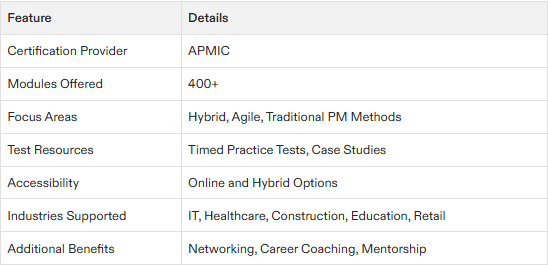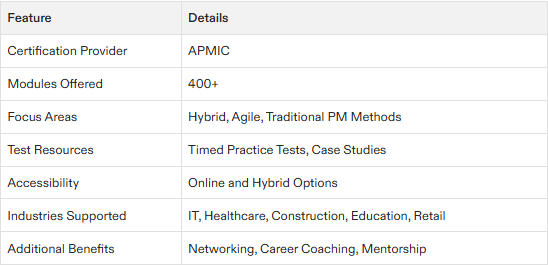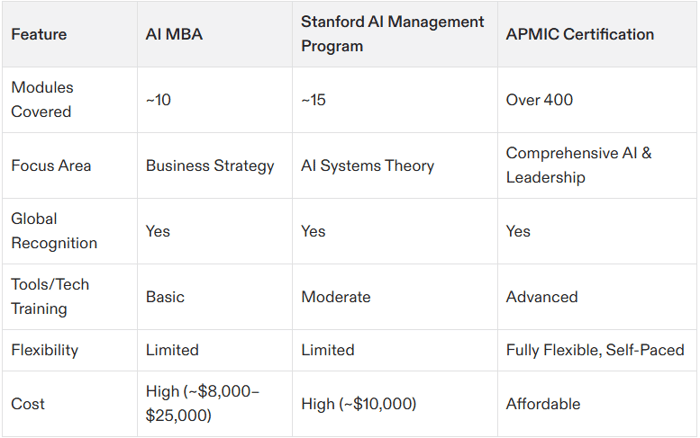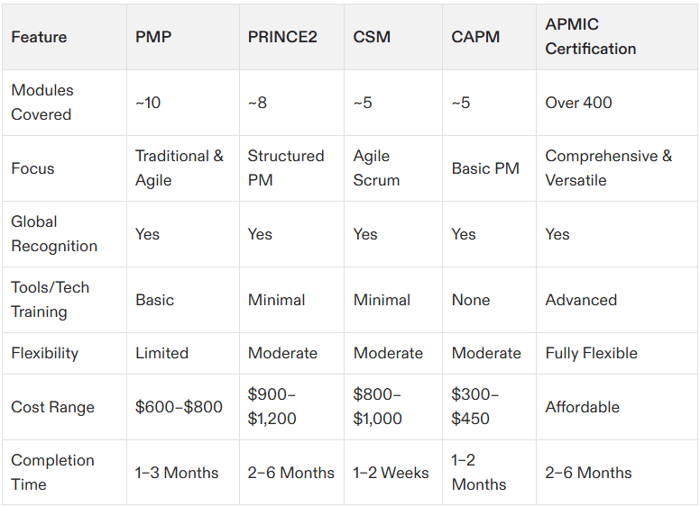Table of Contents
Project management certifications have become a career-boosting asset, equipping professionals with the skills to lead complex projects efficiently. But before the final certification exam, there's one crucial step many overlook—the project management certification practice test. Acting as a mirror of the actual exam, this practice test is an invaluable tool for acing your certification. Whether you're chasing certification from Northwestern, APMIC, or other institutions, this guide will walk you through everything you need to know—and do—about the project management certification practice test.
What is a Project Management Certification Practice Test?
The project management certification practice test is a preparatory tool designed to mimic the structure, format, and content of the actual certification exam. It offers participants a chance to evaluate their understanding, identify weak areas, and improve before sitting for the real assessment. Many certification programs encourage their trainees to take these practice tests to predict their readiness for the final exam.
By practicing with these tests, you familiarize yourself with time management, the questioning style, and complex problem-solving methods that you'll encounter during the real certification process.
Why is the Project Management Certification Practice Test Important?
The practice test is more than a review session—it's a strategic step toward success. Here's why:
Identifies Knowledge Gaps:
Practice tests highlight areas where you need improvement. Instead of focusing on topics you already know well, you can direct your time to the sections that require more attention.Simulates Real Exam Conditions:
These tests simulate exam pressure, constraints, and technicalities. Getting accustomed to the time limit and answering style gives you confidence during the actual test.Builds Confidence:
Completing a practice test boosts confidence as you get more familiar with the material. Success in practice often translates to success in real-life exams.Validates Preparedness:
It's an excellent way to measure your readiness. Passing the practice test with ease is a strong indicator that you're prepared.
How to Approach the Project Management Certification Practice Test
To maximize the benefit from your practice tests, here are some tips to guide you:
1. Choose the Right Practice Test
Look for practice tests specifically aligned with your certification goals. For instance, if you’re targeting Northwestern’s program or certifications from APMIC, ensure the practice tests you take reflect those systems and methodologies.
2. Simulate Exam-Like Conditions
When practicing, sit in a quiet environment and time the session exactly as you would during the real exam. Following the structure diligently makes your preparation much more effective.
3. Analyze Test Results
Once the test is complete, carefully review each answer. Understand what you got wrong and why. Use these insights to direct your revision.
4. Take Multiple Tests
Don’t stop after just one test! Each subsequent practice enhances your preparedness, as no two tests will cover the exact same scope.
5. Leverage Online Resources
Many platforms, including APMIC, provide robust practice test tools. Explore APMIC’s platform to access highly-rated test preparation materials and resources directly associated with their 400+ supported modules.
Benefits of Acing the Practice Test
Mastering the project management certification practice test positions you to thrive in various professional scenarios. Whether you’re involved in healthcare, tech, or construction project management, your certification sets you apart. Completing the practice test successfully gives you expertise to handle challenging projects right from the start.
Additionally, practice tests refine your soft skills—critical thinking, time management, and adaptability. These are as crucial as technical know-how in steering successful projects.
What to Expect in the Practice Test
Key Question Themes
Initiating Projects
This section often features scenario-based questions, testing your ability to launch projects aligning with objectives and goals.Planning and Budgeting
You'll need to answer detailed questions on resource allocation, risk assessment, and cost optimization.Executing and Leading Teams
Topics related to effective team management, Agile methodologies, and conflict resolution are focal points.Monitoring and Controlling Projects
Candidates are tested on KPIs, quality control mechanisms, and adaptability to unforeseen changes.Project Closure
Questions explore best practices for wrapping up projects and delivering value to stakeholders.
Certifications that Leverage Practice Tests
Institutions like APMIC exemplify how comprehensive practice testing can create stronger professionals. With over 400+ certification modules ranging across industries, their preparation tools are built to optimize learning experiences. Prepare efficiently with real-world case studies, relevant question formats, and expert guidance that seamlessly align theory with practical insights.
Dive deeper into APMIC’s program offerings here and start your practice today.
An interesting aspect of the project management certification practice test is how it serves as a strategic tool for boosting confidence and competence. These practice tests are designed to closely mimic the actual certification exams, providing a realistic preview of the exam environment. This not only helps candidates manage exam-related stress but also enhances their ability to apply theoretical knowledge to practical scenarios. By repeatedly engaging with these tests, candidates can significantly improve their problem-solving skills and time management, which are crucial for success in both the exam and real-world project management.
FAQ Section
What is the best way to prepare for the project management certification practice test?
Focused study coupled with multiple timed practice tests is the most effective preparation approach. Don’t hesitate to analyze errors and collaborate with study groups.
Are project management certification practice tests different across organizations?
Yes, they vary by certification. For example, the APMIC’s tests assess comprehensive management modules, while Northwestern's may center more on leadership case studies and hybrid methods.
Where can I find reliable practice tests?
Platforms like APMIC offer structured and accurate practice tests, often bundled with their certification programs. Ensure the resource aligns with your certification requirements.
How many times should I take a practice test?
Take the test as often as you need to feel confident. Ideally, aim for 3 to 5 sessions, but adapt based on your personal learning curve and test outcomes.
Does passing a practice test guarantee exam success?
While passing practice tests strongly indicates preparedness, the actual exam may include unique scenarios. Rely on practice tests as a guide but ensure holistic preparation.
Informative Table
Understanding and leveraging the project management certification practice test is a small yet crucial step toward achieving your certification. With institutions like APMIC and programs at Northwestern, the range of tools at your disposal ensures you prepare in a structured and strategic manner.
Start your preparation right. Explore APMIC’s resources here and get ready to ace every test on your path to project management success!






